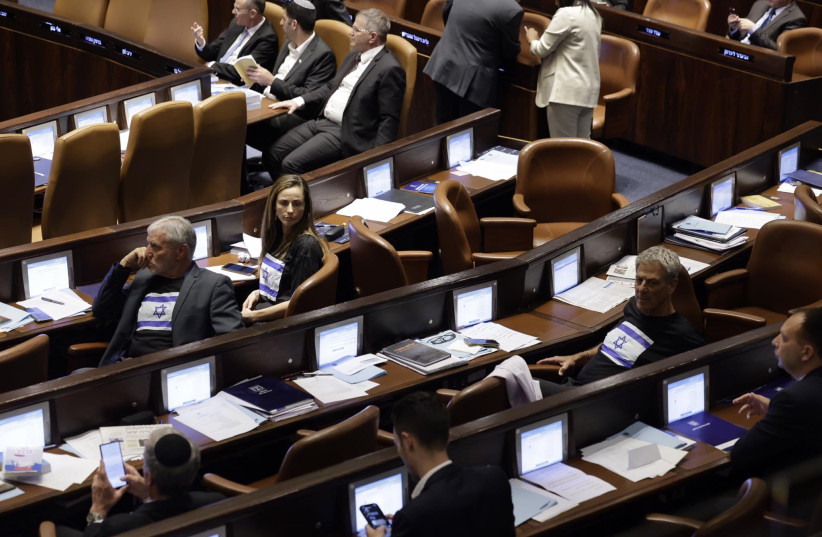Israel’s Knesset begins controversial debate on reasonableness standard
The first reading of the controversial Reasonableness Standard Bill began in the Knesset plenum on Monday evening.
The bill was expected to pass the reading and protests were planned throughout the country on Tuesday as a result.
If it passes, the bill’s next stage will be a return to the Knesset Constitution, Law and Justice Committee, which already on Tuesday will begin to prepare it for its second and third reading.
Protest organizers announced ahead of the vote that if the bill passes its first reading, Tuesday will be a “Day of Disruption” at dozens of locations throughout the country, including at Ben Gurion International Airport.
The “reasonableness standard bill” is an amendment to Basic Law: The Judiciary, that would block Israel’s courts from applying what is known as the “reasonableness standard” to decisions made by elected officials. The reasonableness standard is a common law doctrine that allows for judicial review against government administrative decisions that are deemed beyond the scope of what a responsible and reasonable authority would undertake.
 From Left: Justice Minister Yariv Levin, Prime Minister Benjamin Netanyahu, National Security Minister Itamar Ben-Gvir, Health Minister and Interior Minister Moshe Arbel, and Energy Minister Israel Katz, in Jerusalem, on July 10, 2023. (credit: MARC ISRAEL SELLEM/THE JERUSALEM POST)
From Left: Justice Minister Yariv Levin, Prime Minister Benjamin Netanyahu, National Security Minister Itamar Ben-Gvir, Health Minister and Interior Minister Moshe Arbel, and Energy Minister Israel Katz, in Jerusalem, on July 10, 2023. (credit: MARC ISRAEL SELLEM/THE JERUSALEM POST)Proponents of the law argue that it is a highly subjective tool for judicial activism that allows the court to subvert government policy with its own views. Critics, including the attorney general, argue that the tool is essential to counter corruption and to ensure the protection of individuals from arbitrary and capricious government decisions.
The court used the reasonableness standard, for example, when it ruled in January that Prime Minister Benjamin Netanyahu‘s decision to appoint Shas chairman Aryeh Deri to two ministerial positions, despite three criminal convictions on white-collar crime committed while in power, suffered from “extreme unreasonableness.” Netanyahu was forced to fire Deri. Should the reasonableness standard bill pass into law, the prime minister may attempt to reappoint Deri to his former positions of Health Minister and Interior Minister.
What did MKs have to say in the debate?
Knesset Constitution, Law and Justice Committee chairman MK Simcha Rothman introduced the bill, which he argued was “balanced, responsible, and significantly different from what perhaps should have been legislated.”
Rothman listed a number of academics and judges who believed that the reasonableness standard gave the courts broader power than what they should have, and argued that prior to the expansion of the use of the reasonableness standard in the 1980s, Israel was still a democracy. The bill would simply return the state to what existed during its first three decades, Rothman said.
Opposition leader MK Yair Lapid responded, “At least tell the truth. This law enables the appointment of a convicted minister; a law that enables the sending out of arrest warrants to whoever protests against the government; this is a law that enables the firing of the attorney general, in order to arrange a plea-bargain for your boss [Netanyahu].”
“We have an agreement – that we do not trample each other. Today you are breaking and violating this contract,” Lapid added.
 Opposition members wear Israel flag T-shirts to the debate. (credit: MARC ISRAEL SELLEM)
Opposition members wear Israel flag T-shirts to the debate. (credit: MARC ISRAEL SELLEM)The Knesset members from Yesh Atid who participated in the debate wore black shirts with a flag of Israel on them as an act of identification with the protestors against the judicial reforms.
The reasonableness standard bill was part of a package of bills introduced by the government in January that would have given the government and Knesset more power at the expense of the judicial system. One of the bills proposed to amend the makeup of the Judicial Selection Committee, such that the government would have a majority and thus the power to appoint Israel’s judges at all levels. The bill stalled after Defense Minister Yoav Gallant warned that it would lead to discord in the IDF and large-scale refusals to fulfill reserve duty, which could harm Israel’s national security.
Reservists threaten to protest if bill passes
Reservists made similar threats in recent days. These included pilots, members of elite intelligence units, and other units. Some threatened to cease their volunteering already after the bill passed its first reading – and not when it passes readings two and three.
Netanyahu released a video statement as the debate over the reasonableness standard bill began on Monday afternoon. The prime minister argued that the coalition’s intention was to amend the use of the standard based on guidelines laid out by Supreme Court Justice Noam Sohlberg. In addition, according to Netanyahu, both former Supreme Court Chief Justice Asher Grunis and former Supreme Court Justice Ayala Froccacia supported the amendment, on the grounds that it would prevent the court from “entering realms that it does not belong in.” The court will continue to oversee government decisions and appointments and ensure that they are made “in good faith, proportion, fairness and equality.”
Amending the reasonableness standard based on Sohlberg’s framework thus strengthens democracy and does not weaken it, and “definitely is not an excuse to call for refusal [of military reserve duty], or to disrupt the lives of millions of civilians.”
President Isaac Herzog said in a speech earlier on Monday that the only way to end the political crisis was “to sit down and talk.”
“In the midst of a deep and worrisome crisis, the responsible act of leadership must be to sit, talk, and put Israel’s unity above all else. Public leaders – from the coalition and opposition – must talk and heal the schism. And this needs to happen now,” Herzog said.
Finance Minister Bezalel Smotrich said at a press conference ahead of his Religious Zionist Party weekly meeting on Monday afternoon that the coalition was determined to pass the bill into law by the end of the Knesset’s current term on July 30.
Michael Starr contributed to this report.





Comments are closed.